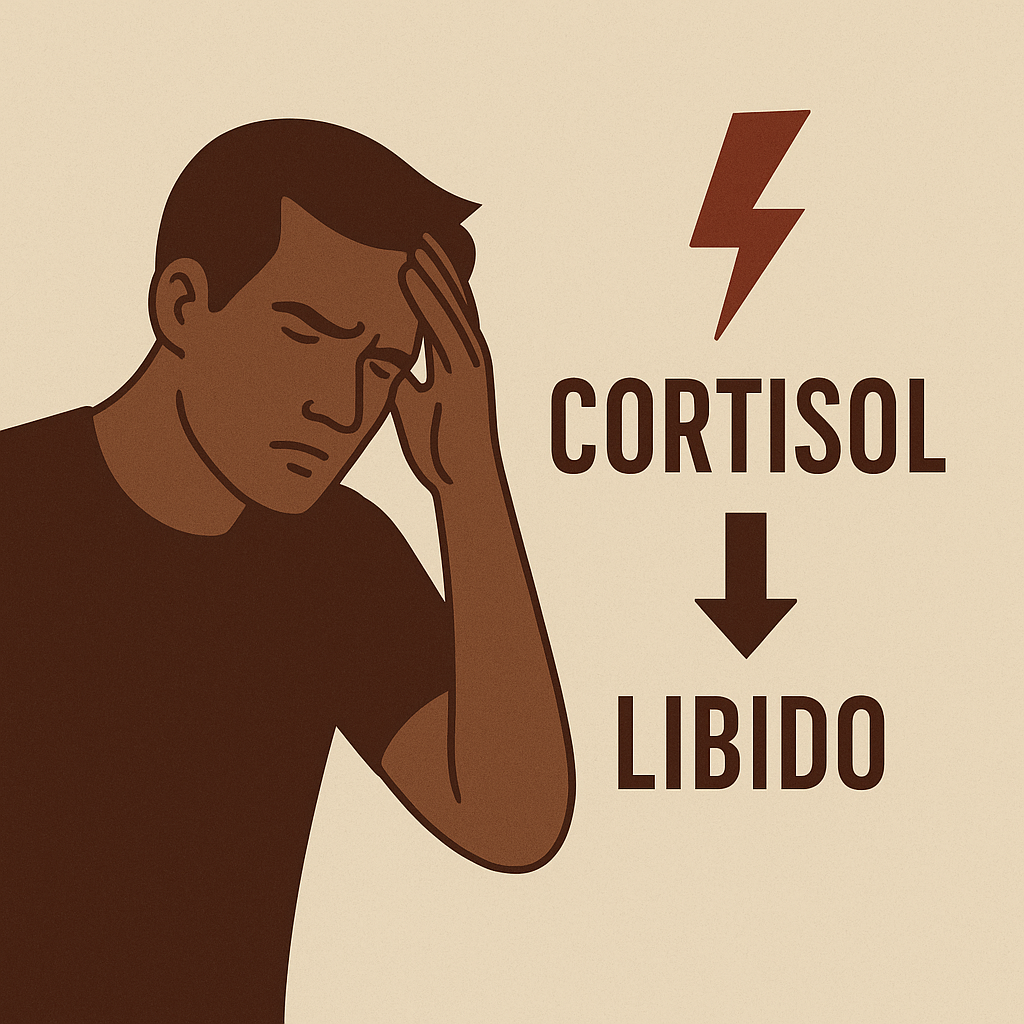Low libido is often blamed on ageing, relationships, or mental burnout. But for many men, the real issue starts with a hormone that gets far less attention than testosterone: cortisol.
In this blog, we’ll break down how chronic stress and elevated cortisol levels can suppress sexual desire, reduce energy, and throw your hormonal balance off track—and what you can do to start fixing it.
🧪 What Is Cortisol?
Cortisol is the body’s primary stress hormone, released by the adrenal glands in response to physical or psychological stress. It’s designed to help in the short term—boosting alertness, raising blood sugar, and preparing the body for action.
But when stress becomes chronic, cortisol stays elevated—and that’s where the problems begin.
❌ How High Cortisol Affects Libido
1. Suppresses Testosterone Production
Testosterone is critical for libido, energy, and confidence. Chronically high cortisol has been shown to inhibit testosterone synthesis, reduce free testosterone levels, and interfere with the brain’s hormone signalling systems [1].
In simple terms: if your cortisol stays high, your testosterone can’t do its job.
2. Reduces Blood Flow and Physical Response
Cortisol acts as a vasoconstrictor—narrowing blood vessels, which can restrict blood flow to areas where you need it. This can lead to reduced physical arousal, lower libido, and difficulty maintaining sexual performance [2].
3. Blunts Dopamine and Mood
Cortisol can also blunt the brain’s dopamine response—the neurotransmitter tied to pleasure, motivation, and reward-seeking behaviour. This can create a sense of emotional flatness or detachment, even in situations where sexual interest would normally be high [3].
⚠️ Signs Your Low Libido Could Be Stress-Related
If your sex drive has dropped and you’re also experiencing:
- Broken or poor-quality sleep
- Low morning energy or poor recovery
- Heightened irritability or flat mood
- Brain fog or reduced focus
- Feeling “tired but wired” in the evenings
…it’s worth considering whether stress—and elevated cortisol—is playing a role.
🔁 The Cortisol-Testosterone Feedback Loop
Cortisol and testosterone often operate in opposition. When one is up, the other tends to be down. And unfortunately, stress-related habits—like poor sleep, overtraining, undereating, or excessive screen time—can keep you locked in a loop where recovery never quite happens.
🛠️ How to Break the Cycle
1. Fix Your Sleep
Cortisol is regulated by your circadian rhythm. Staying up late, waking during the night, or skipping deep sleep keeps cortisol elevated and testosterone suppressed. Aim for 7–9 hours of quality, uninterrupted rest.
2. Train Smart and Recover Smarter
Exercise lowers cortisol in the long run, but overtraining without recovery will elevate it. Combine strength training with mobility work, walking, or rest days.
3. Improve Nutrient Intake
Magnesium, vitamin D, zinc, and healthy fats are all essential for testosterone production and stress recovery. Avoid extreme calorie cuts or low-fat diets.
🌿 Natural Support: The Role of Adaptogens
Adaptogens are natural compounds that help the body regulate stress responses—making them useful in supporting cortisol-testosterone balance.
Tongkat Ali
A well-researched adaptogen shown to lower cortisol and improve testosterone levels. One study found that 4 weeks of supplementation improved tension, anger, and confusion scores—alongside a healthier testosterone-to-cortisol ratio [4].
Fadogia Agrestis
Though less studied, Fadogia is traditionally used to support vitality and testosterone production. It’s often taken alongside Tongkat Ali to support hormonal health from multiple angles.
Together, these two form the Vitality Duo—a daily supplement approach designed to help men combat low energy, low libido, and hormone-related fatigue.
✅ Final Thoughts
If your libido has dropped and nothing else seems to be working, it might not just be in your head. Chronic stress and high cortisol levels have a well-documented impact on testosterone, dopamine, and sexual desire.
The good news? With the right lifestyle changes—and the right support—you can break the cycle and start to feel like yourself again.

